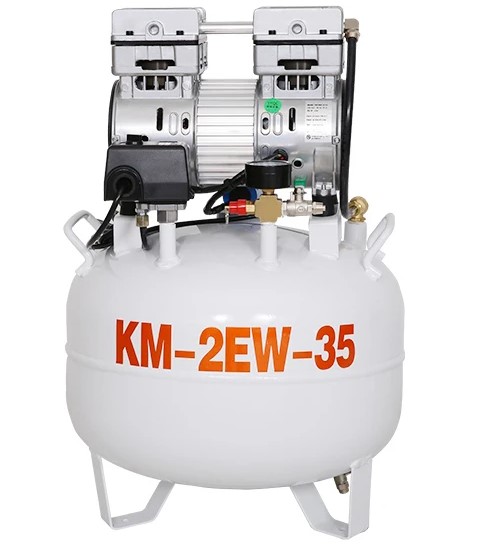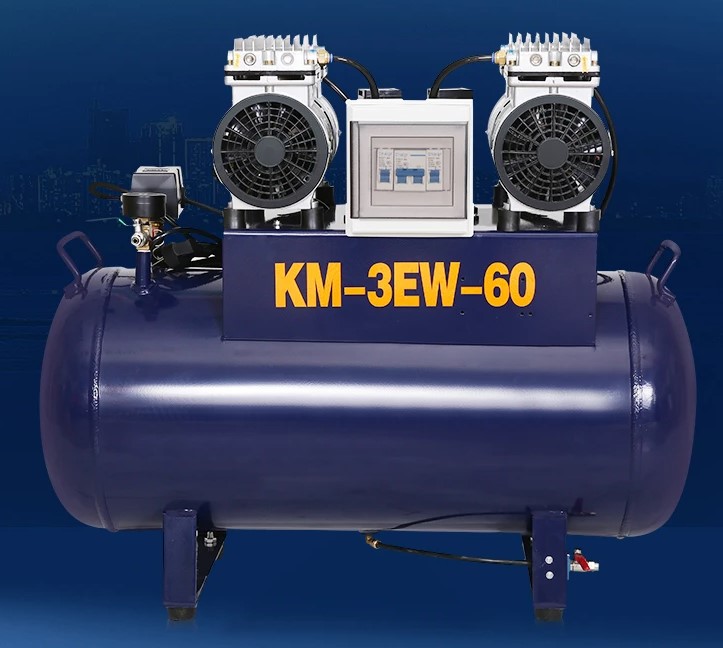Air compressors are devices that convert power into potential energy stored in compressed air. They find applications in numerous industries, including construction, manufacturing, automotive, and healthcare. The two main types of air compressors available in the market are oil and oil-free compressors. However, what are the differences between them?
Oil air compressors utilize lubricating oil to operate effectively. They have a piston-driven system that compresses the air while the lubricating oil guarantees smooth operation and cooling of the components. The oil also acts as a sealant, preventing air leakage.
Oil air compressors require regular oil changes and maintenance to ensure optimal performance. The lubricating oil needs to be monitored and replenished at appropriate intervals. This part of maintenance is critical for preventing oil contamination and ensuring the compressor's lifespan.
Moreover, they are commonly used in heavy-duty applications that demand continuous operation and higher air pressure. Oil air compressors are commonly used in industries such as construction, manufacturing, and mining due to their durability and ability to handle severe workloads.

Unlike oil air compressors, oil-free compressors do not require lubricating oil for operation. They employ alternative mechanisms such as scroll or diaphragm technology to compress the air. Oil is no longer required in the compression chamber, resulting in oil-free compressed air.
One of the significant advantages of oil-free air compressors is their reduced maintenance requirements. They do not require frequent oil changes or monitoring of oil levels because they do not rely on oil. This makes oil-free compressors more suitable for some applications.
Besides, oil-free air compressors are often employed in sectors where air quality is critical, such as medicines, food processing, and electronics. They provide clean and oil-free compressed air, ensuring product integrity and preventing contamination.

Air Compressor For Cement Bulker
When comparing oil and oil-free air compressors, several performance factors come into play. Here are some factors:
Efficiency is a crucial consideration when it comes to air compressors. In terms of energy consumption, oil air compressors tend to be more efficient. The presence of lubricating oil enables smoother operation and reduces friction, resulting in lower energy requirements. However, technological improvements have considerably increased the energy efficiency of oil-free compressors. Modern oil-free compressors have bridged the gap, making them more energy-efficient than ever before.
Another critical aspect to consider is air quality. Oil air compressors may introduce a small amount of oil vapor into the compressed air during the compression process. While this might not be an issue in many applications, certain industries have strict air quality requirements. In such cases, oil-free air compressors offer a clear advantage. They provide clean, oil-free compressed air, eliminating the possibility of oil contamination in critical applications such as food processing, medicines, and electronics.

Dental Portable Turbine Unit With Air Compressor Inside
Noise pollution can be a concern, particularly in environments where noise levels need to be minimized. In this regard, oil-free air compressors tend to have an advantage. They are generally quieter during operation compared to oil air compressors. This makes them especially ideal for noise-sensitive areas or circumstances where noise pollution reduction is a concern.
When selecting an air compressor, it is critical to consider the maintenance needs. Oil air compressors require routine maintenance to guarantee peak performance. This involves monitoring and replacing the lubricating oil at predetermined intervals, as well as frequent oil changes. On the other hand, oil-free compressors require less maintenance. They eliminate the need for oil changes and monitor oil levels, making them more convenient and cost-effective in the long run.
Durability is a vital factor, especially in heavy-duty applications that involve continuous operation. Oil air compressors are generally known for their robustness and ability to handle heavy workloads. However, technological developments have substantially enhanced the longevity of oil-free compressors. Modern oil-free compressors are built to survive harsh circumstances and provide consistent performance over long periods of time.
Oil and oil-free air compressors serve different purposes in various industries. By understanding the differences between these two types, you can make an informed decision. If you are looking for an Oilless Air Compressor, HAGER can help you. Come and get more product details from us!
Copyright 2021 All Right Reserved.